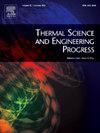冶金转炉预热瞬态热-力学模型
IF 5.1
3区 工程技术
Q2 ENERGY & FUELS
引用次数: 0
摘要
在冶金过程的转炉预热处理步骤中,在实时处理尺度上对热动力学进行建模是一项复杂的数值计算,并且对详细的时间分辨分析具有挑战性。由于时间尺度的限制,在气态燃料系统中紊流燃烧的流体相内的物理现象在数值上是昂贵的。除流体区域外,由多个具有不同物理性质的固体区域组成的任意实尺度几何以及它们之间的相互作用是影响几何尺寸及其建模复杂性的另一个因素。此外,高温会导致材料中的热应力,这是热膨胀的结果,最后可能导致材料失效,影响整个系统的可靠性。本文描述了基于小火焰法的紊流燃烧瞬态多区域求解器的实现计算效率公式,以及工业应用中有限体积法的热应力和机械应力评估。本文章由计算机程序翻译,如有差异,请以英文原文为准。
Transient thermo-mechanical modeling of real-scale metallurgical converter preheating
Modelling the thermal dynamics occurring during the converter preheat treatment step of a metallurgical process on a real-time processing scale is numerically complex and challenging for detailed time-resolved analysis. Physical phenomena within the fluid phase with turbulent combustion in the systems with gaseous fuel, are numerically expensive due to prevailing time scales. Arbitrary real-scale geometries consisting, in addition to the fluid zone, of multiple solid regions with different physical properties and the interaction between them, are another influential factor for the geometry size and its modeling complexity. Furthermore, high temperatures lead to thermal stress in the material, as the result of thermal expansion, which in the last consequence can cause material failure affecting the reliability of the entire system. This paper describes the implemented computationally efficient formulation of the transient multi-region solver with turbulent combustion based on the flamelet approach and the evaluation of the thermal and mechanical stresses in an industrial application within the finite volume method.
求助全文
通过发布文献求助,成功后即可免费获取论文全文。
去求助
来源期刊

Thermal Science and Engineering Progress
Chemical Engineering-Fluid Flow and Transfer Processes
CiteScore
7.20
自引率
10.40%
发文量
327
审稿时长
41 days
期刊介绍:
Thermal Science and Engineering Progress (TSEP) publishes original, high-quality research articles that span activities ranging from fundamental scientific research and discussion of the more controversial thermodynamic theories, to developments in thermal engineering that are in many instances examples of the way scientists and engineers are addressing the challenges facing a growing population – smart cities and global warming – maximising thermodynamic efficiencies and minimising all heat losses. It is intended that these will be of current relevance and interest to industry, academia and other practitioners. It is evident that many specialised journals in thermal and, to some extent, in fluid disciplines tend to focus on topics that can be classified as fundamental in nature, or are ‘applied’ and near-market. Thermal Science and Engineering Progress will bridge the gap between these two areas, allowing authors to make an easy choice, should they or a journal editor feel that their papers are ‘out of scope’ when considering other journals. The range of topics covered by Thermal Science and Engineering Progress addresses the rapid rate of development being made in thermal transfer processes as they affect traditional fields, and important growth in the topical research areas of aerospace, thermal biological and medical systems, electronics and nano-technologies, renewable energy systems, food production (including agriculture), and the need to minimise man-made thermal impacts on climate change. Review articles on appropriate topics for TSEP are encouraged, although until TSEP is fully established, these will be limited in number. Before submitting such articles, please contact one of the Editors, or a member of the Editorial Advisory Board with an outline of your proposal and your expertise in the area of your review.
 求助内容:
求助内容: 应助结果提醒方式:
应助结果提醒方式:


